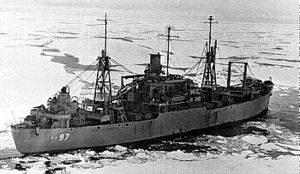USS Merrick (AKA-97)
 USS Merrick (AKA-97) USS Merrick (AKA-97) | |
| History | |
|---|---|
| Laid down: | 19 October 1944 |
| Launched: | 28 January 1945 |
| Commissioned: | 31 March 1945 |
| Decommissioned: | 26 June 1946 |
| Recommissioned: | 19 January 1952 |
| Decommissioned: | Unknown |
| Struck: | Unknown |
| Fate: | Unknown |
| General Characteristics | |
| Hull type: | C2-S-B1 |
| Displacement: | 6,761 tons |
| Length: | 459 ft 2 in (140 m) |
| Beam: | 63 ft (19.2 m) |
| Draft: | 26 ft 4 in (8.0 m) |
| Speed: | 16.5 knots (31 km/h) |
| Complement: | 247 |
| Armament: | 1 × 5"/38 caliber dual purpose gun mount, 4 × 3 in gun mounts |
USS Merrick (AKA-97/LKA-97) was an Andromeda class attack cargo ship named after Merrick County, Nebraska.
1944-1946
Merrick (AKA–97) was laid down as Maritime Commission hull 219, 19 October 1944 by Federal Shipbuilding and Drydock Co., Kearny, N.J.; launched 28 January 1945; sponsored by Mrs. Francis N. Van Riper; acquired 30 March and commissioned 31 March 1945, LCDR Walter E. Reed, USNR, in command.
Merrick cleared Norfolk 15 May 1945 for training at Pearl Harbor and duty transporting cargo, landing craft, and troops among the Marshalls and New Hebrides until the close of the war. She then carried occupation troops from Hawaii and the Philippines to Japan and brought veterans, including Marine war dogs, back to Norfolk, arriving 3 December.
After 9 months of east coast operations, Merrick sailed in October 1946 with TG 68.1 for Port Hueneme, CA to load cargo for operation "Highjump," the largest (to 1968) American Antarctic expedition. She set course south 5 December, and entered the Ross Sea 31 December. The group reached the Bay of Whales 15 January 1946 and there established Little America IV, the base for the expedition’s significant scientific achievements.
Threatening ice conditions forced the retirement of the communications and supply ships 8 February. Three days later Merrick’s rudder was damaged by ice; USCGC Northwind (WAGB-282), a Coast Guard icebreaker, took her in tow, but before they had cleared the ice, her rudder was completely sheared off. The perilous tow ended at Dunedin, New Zealand, 22 February. After repairs, Merrick departed for California 22 March, fought boiler failures and fuel shortages during her passage, and reached San Francisco. Here she decommissioned 25 June 1946 and entered the National Defense Reserve Fleet.
1950s
Berthed at Suisun Bay, CA, until recommissioning 19 January 1952 for service in the Korean conflict, Merrick reported at Yokosuka, Japan, 2 July to carry cargo and men among the Japanese islands until returning California 7 October for overhaul and training. Her second Far Eastern tour, 3 July 1953 to 22 April 1954, included 2 months in operation "Big Switch," the postarmistice prisoner exchange. She carried more than 6,400 prisoners from Koje-do and Cheju-do to Inchon, then trained Army and Marine Corps troops in amphibious exercises in the Philippines and at Iwo Jima.
1960s
Through 1963, Merrick’s annual deployments were with the 7th Fleet in the western Pacific, other than in 1955 and 1957, when she sailed to supply military and sealing stations in the Arctic. As conflict in Vietnam intensified, Merrick served her first tour in the South China Sea in 1963, returning annually through 1969. Support for the forces of the free nations repelling Communist aggression has included troop lifts from Okinawa and the Philippines to South Vietnam as well as participation in landings at Hue and Chu Lai (1965) and on the Saigon River Delta (1966). The latter marked the Navy’s first extension of amphibious combat capability on an inland waterway since the Civil War. Between deployments she has maintained her readiness through training and necessary overhauls on the west coast. She was reclassified LKA–97 on 1 January 1969.
References
- Dictionary of American Naval Fighting Ships (Primary source for this article)